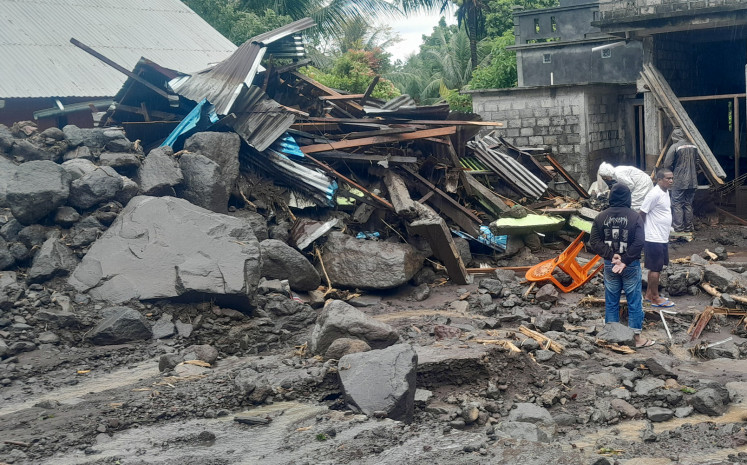Popular Reads
Top Results
Can't find what you're looking for?
View all search resultsPopular Reads
Top Results
Can't find what you're looking for?
View all search resultsMessage for Japan: Japan: Standing tall on shaky ground
One month ago, the destiny of thousands of Japanese was altered when nature unleashed its unbridled fury on the world’s third largest economy
Change text size
Gift Premium Articles
to Anyone
O
ne month ago, the destiny of thousands of Japanese was altered when nature unleashed its unbridled fury on the world’s third largest economy. Today, the story may have slipped from the front pages of global newspapers, but in Japan, the roar of the tsunami continues to haunt.
Standing taller than the monster tsunami that pummeled its coastline is the indomitable spirit of the Japanese.
What a raging sea and a heaving earth could not ravage was the deep-rooted Confucian ethos, the philosophy of endurance or gaman enshrined in the national psyche.
So much has been written about gaman and its significance in the Japanese context. “Calm endurance”, “control for the sake of others” and “bearing the unbearable” are some interpretations of this word, widely credited for the incredible stoicism displayed by the Japanese during this crisis.
What karma is for Hindus, gaman is for the Japanese. It is not something they practice consciously as they go about their day-to-day
lives, rather, it is intuitive and therefore, intrinsic to their behavior and thinking.
“We don’t really stop and think about gaman too much, because for us, there’s no second way,” says Yusei Watanabe, an expatriate Japanese whose family lives 60 kilometers from the nuclear plant in Fukushima.
“You know there is hardship and you just plough through. I think it is difficult for foreigners to understand the nuances of gaman, but for us, it is just something we have grown up with.”
An explanation for this endurance is possibly rooted in the culture and spirituality of Buddhism and Shintoism, and the ethics of Confucianism, which came to Japan from China around the sixth century. All three philosophies are still deeply embodied in modern Japan.
Kirby Daley, senior strategist with Newedge Group in Hong Kong and a regular commentator on Japan, said: “Gaman is not new to the Japanese, with the origin of the term coming from the teachings of Zen Buddhism. While the simple, modern-day usage in Japan can often be equated to “patience,” a common and much more descriptive definition is “enduring the seemingly unbearable with patience and dignity”. Those who are not versed in the virtue of gaman may have been astounded at how pervasive this behavior has been in Japan.”
Like the towering, snow-capped presence of Mount Fuji, Japan’s dignity too has soared formidably above the destruction. The world watched in awe at Japan’s exemplary response, the single-file queues for food and water, even as the enormity of the disaster continued to swell.
A nation that rose from the nuclear devastation of war, and embraced pacifism as its raison d’être, this is a country where community and compromise are prioritized above the individual.
“It is a very simple one-sentence philosophy,” explains Watanabe. “We were taught that whatever conveniences you, inconveniences another. My family is in Fukushima and yes, it is dangerous for them to be there, but there is no concept of just getting up and leaving town. They will never abandon the community.”
For this island nation that remained fiercely independent through most of its history, suffering is not a new experience.
From the time US Commander Matthew Perry forced Japan’s Tokugawa Shogunate to end its seclusion in 1853, to the Great Kanto quake in 1923, WWII and again the 1995 Kobe quake, Japan has shown an innate ability to bounce back, stronger than ever.
Once again, these virtues are being tested as the country struggles to pick up the pieces and rebuild itself. But experts warn the cumulative effects of this tragedy will be felt for at least a generation, both socially and economically.
The government has estimated the damage from this disaster will run into billions of dollars, one of the costliest natural disasters.
“While there is great hope espoused by some that these events will somehow result in a positive shock to the Japanese economy, other than the temporary statistical boost from the rebuilding, the overwhelming impact, sadly, will be quite the opposite,” says Daley. “Consumer sentiment and confidence have been fragile in Japan for years. The memory of this tragedy and overhang of the nuclear disaster, the extent of which is not yet fully known, will knock its confidence hard creating a further drag on an already moribund economy.”
Meanwhile, many expatriate Japanese across Asia are feeling the pain, even if they are physically distanced from their homeland.
Satoko Yonezawa cannot stop thinking about her family who live in Sendai, one of the worst-hit areas. They were among the lucky ones to escape the 20-foot wall of water that swallowed the town. Satoko knows the risks of radiation, her father is from Hiroshima and her uncle, a victim of radiation from the war, developed cancer.
“Even if you regret or think ‘what if’, you can’t change what has happened,” says Satoko. “You just have to remember what you learned from the problem. We must think how ‘we’ can do better, not only ‘I’. We have to stay positive and do what we can do, cooperate with each other and keep going forward, even if each step is very little.”
In a society where emotional displays are more rare, many Japanese turn to haiku, the traditional poetry composed of seventeen syllables, to express their innermost feelings and emotions.
In this time of crisis, people have been finding solace in this poetry form, a soothing escape from the miasma of despair that has engulfed them since the earthquake occurred a month ago.
Mikagirishi
Kokyo no sakura
Saki ni keri
(In my deserted home village
The old cheery tree
Now in bloom.)
— Kobayashi Issa (1763-1827)
Ochiba funde
Hito donen o
Matto-su
(My mind
Is calm and resigned
As I tread on the fallen leaves)
— Iida Dakotsu (1885-1962)
Ashwini Devare, former BBC correspondent, now executive producer for Vichaar media










